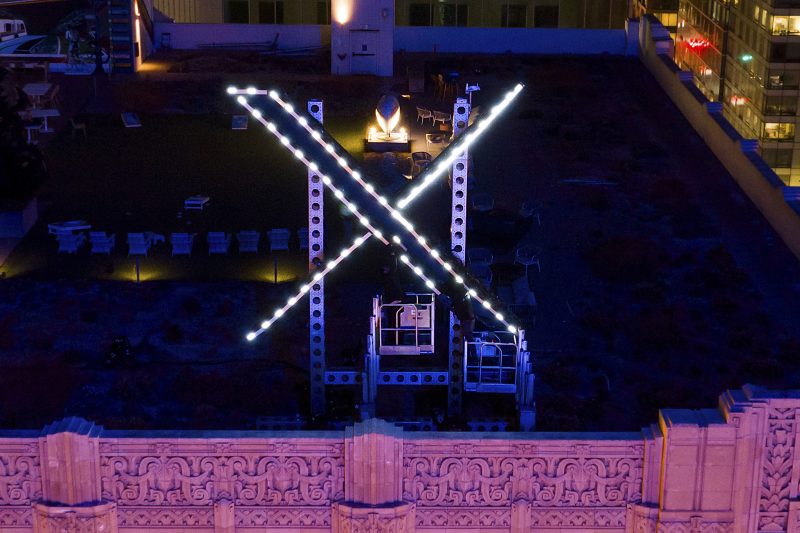The social media platform X, formerly known as Twitter, has removed the gold “verified” badge from the New York Times’ account amid ongoing complaints about the news organization from X owner Elon Musk.
The badge was the only symbol distinguishing the Times’ 55-million-follower account from impostors amid two major global conflicts in Israel and Ukraine. X has hosted and helped amplify a flood of false information related to the Israel-Gaza war, some of which Musk has personally endorsed.
The badge was removed Tuesday without notice, a person familiar with the change said. The Washington Post, the Wall Street Journal, the Associated Press, CNN, Bloomberg, Vox and other news organizations still had their gold badges as of Thursday afternoon. Times accounts related to coverage of world news, health and other subjects still show “verified” badges.
The move further extends Musk’s attempts to use the social media company he bought with claims of defending free speech to undercut news organizations he dislikes. It also suggests Musk has adopted the kinds of secretive social media tactics he and Twitter’s conservative critics once loudly denounced.
Neither X nor Musk responded to requests for comment.
In April, after Musk bought the company for $44 billion, X ended its years-old system of giving badges to politicians, journalists and other public figures whose identity it had verified. Replacing it was a pay-for-play scheme extending blue badges to any individual who pays $8 a month and gold badges to any “verified organization” that pays at least $1,000 a month.
After the Times declined to pay the fee, Musk tweeted support for its badge to be immediately removed and the Times became the first major account to lose verification. Later in April, X reinstated the badge for the Times and other big accounts, including for those who declined to pay or said they didn’t want it.
Neither the Times nor The Post has ever paid the fee, according to people familiar with both organizations.
The verification system change has made it more challenging for users to seek out official or authoritative information during major news events. A study released Thursday by the media-rating service NewsGuard found that 74 percent of the worst Israel-Gaza misinformation on X had been spread by paid-for blue “verified” accounts.
Musk has repeatedly attacked the Times, saying in August that the news organization supports “calls for genocide” and that “if ever there was a time to cancel that publication, it is now.”
Within days of that post, X had implemented a five-second delay for clicks to the Times’ website. After The Post reported on the delay, X removed it for the Times without explanation but kept it in place for other X competitors, including Facebook, Instagram, Substack and Bluesky, according to a technical analysis from the news outlet The Markup.
Even without the delay, traffic to the Times’ website from X links has plunged roughly 50 percent since August, according to a person familiar with the change.
That steep drop outpaces an industry-wide slowdown in referrals to top news sites from X and Facebook this year, according to industry data from the analytics firm Similarweb first reported by Axios.
On Wednesday, Musk echoed a comment from the far-right influencer Ian Miles Cheong, who in March shared a fake manifesto falsely attributed to a Nashville school shooter, saying the Times had “uncritically regurgitated propaganda” and laughed off a criticism that Musk had removed features making it possible to tell real journalists from fakes. Musk replied, “’Real journalists’ lmaooo.”
The Times runs the 25th most-followed account on X, according to data from the social media analytics firm Social Blade.
Earlier this month, X removed headlines from news articles and other links on the platform and demoted posts with links in its recommendation system — two moves that a Cardiff University professor told The Post were “part of a larger trend toward making Twitter/X more difficult for news organizations to use.” Musk said his goal was to maximize the time people spent on X and said “there is less time spent if people click away.”
In the months since Musk bought X, the social media site has cut back on content moderation, suspended journalists, reinstated neo-Nazis and threatened to file defamation lawsuits against critics such as the Anti-Defamation League. The platform has also shed users and advertisers.
In April, NPR became the first major news organization to stop using the platform after its account was labeled as “state-affiliated media.” In the six months since, NPR’s website traffic has dropped by only 1 percent, according to an internal memo first shared by the news journal Nieman Reports.
Joseph Menn contributed to this report.





























